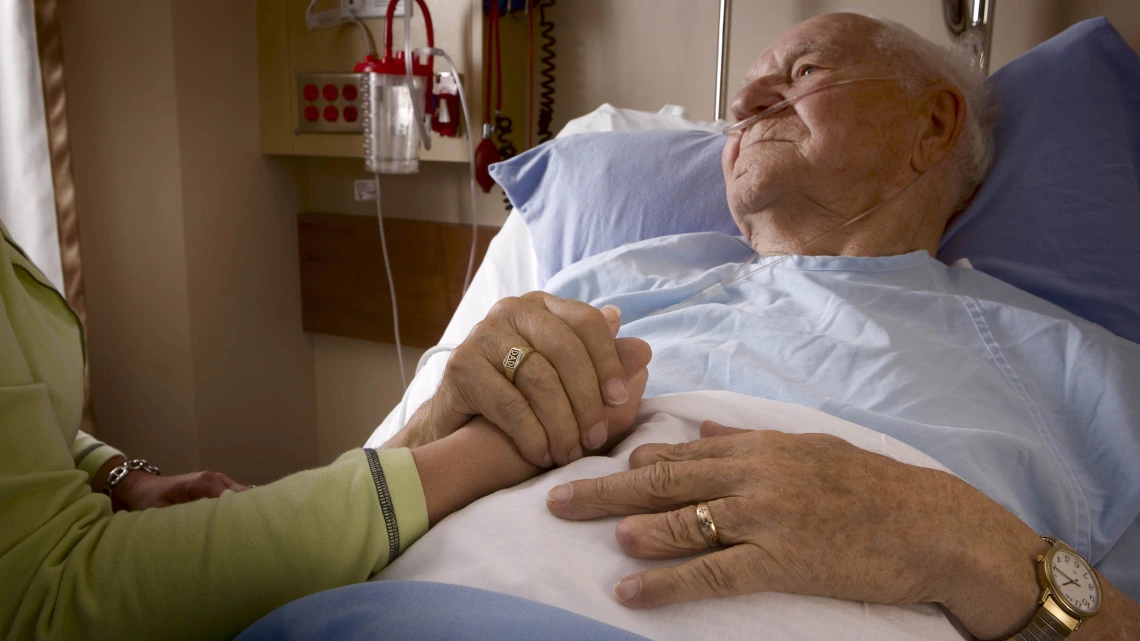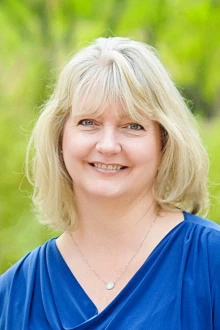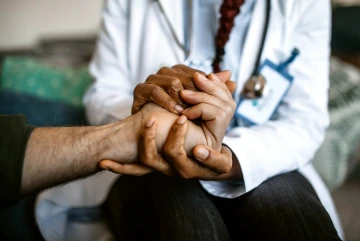Aging Well with Dr. Lisa O’Neill
The UArizona Center on Aging associate director does her best to add value to appreciation of older adults, their caregivers and careers supporting them.

Lisa O’Neill, DBH, MPH, and Mindy Fain, MD, will launch a a six-month pilot for an interprofessional end-of-life care training program for University of Arizona Health Sciences students through the Center on Aging. (Getty Image)
Summer has not been slow for Lisa O’Neill, DBH, MPH, who was busy with a host of projects supporting the health and well-being of older adults in Arizona at the University of Arizona Center on Aging.

Lisa O’Neill, DBH, MPH
Developing a CARES Toolkit
One project is the kickoff of a six-month pilot for an interprofessional end-of-life care training program when fall classes start Aug. 22.
That project was funded by a $500,000 grant from the David and Lura Lovell Foundation, which allowed center and UArizona Health Sciences partners to create the End-of-Life Cases and Resources: An Interprofessional Toolkit for Health Science Students, or CARES Toolkit. The goal is to prepare students to engage in compassionate conversations about serious illness and end-of-life issues, and to fundamentally change how we all talk about death and dying.
The toolkit contains discipline-specific case studies that UArizona Health Sciences colleges and programs can adapt to their curriculum based on educational focus and student needs. They heard from faculty feedback that a toolkit was better than creating a new stand-alone course that had to be added to already full curriculum loads.
The case studies focus on teaching about end-of-life issues across the lifespan with cultural humility. They are tailored for specific training needs that vary for physicians, nurses, pharmacists and public health workers – and even the different roles each of those may play dependingon their specific job or specialty.
“The Health Sciences colleges were able to identify a couple of classes suitable to start incorporating these cases into existing courses,” she said.
Preparing tomorrow’s workforce
Another new Center on Aging program is developing certificate courses for people interested in working with older adults. To start, it will focus on certified nursing assistants (CNAs), physical therapy assistants (PTAs) and emergency medical technicians (EMTs).
Known as the PREPARE Program, it’s designed to help build a workforce to support older Arizonans, paralleling needs identified in the 2023-26 State Plan on Aging regarding current direct care worker shortages. Funding is via a $1 million grant to Dr. Fain from the Arizona Board of Regents through the state’s Technology and Research Initiative Fund.

The Center on Aging is launching certificate courses for certified nursing assistants, physical therapy assistants and emergency medical technicians interested in working with older adults. (Getty Image)
The center will consult with employers on how PREPARE can fill skill gaps may exist in current training programs, broadening employability and job security of certificate holders. She said they will also work with community colleges to promote the certificate courses across the state, particularly in rural areas and among populations underrepresented in health care.
“Maybe a CNA or PTA hasn’t worked with older adults, even though they’ve been certified for a while. They can come in and get a refresher to enhance their geriatric knowledge and begin working in an assisted living center or other facility that caters to older adults,” Dr. O’Neill said. “This is a population that’s not going away, it is only growing. And your employment opportunities are pretty good. That makes it a win-win for the employee, the employer and older Arizonans.”
Early life with grandparents shaped her career
Growing up in a small family in Las Vegas, Dr. O’Neill said her grandparents played a large role in her life. Her father died at age 49, and her mother had health issues.
“My dad’s family were all gone by the time I was born. So, I had one grandmother and grandfather, and they were pretty prominent in our lives,” she said, adding that they inspired her later career decisions.
“I didn't specifically know what I wanted to do with older adults. I just knew that was the population I was most interested in.”
Lisa O’Neill, DBH, MPH
Dr. O’Neill initially did government analysis for the military, then spent several years as a homemaker, during which time she earned a bachelor’s degree in business management. She decided to pursue a master’s in public health at the UArizona Mel and Enid Zuckerman College of Public Health and completed an internship at the Center on Aging.
“That was 2009, and I just never left,” she said. “I didn't specifically know what I wanted to do with older adults. I just knew that was the population I was most interested in. It's a forgotten age group. I don't feel these people get the attention they deserve. Some things we’re taught are negative about older adults. We talk about being ‘over the hill.’ But it’s a great part of life that isn’t appreciated enough.”
Dr. O’Neill worked as an instructional specialist and program coordinator for several years while she pursued additional training and education, including a doctorate in behavioral health. Today, she said, her perspective is a little different from the start of her career.
“It was not as relevant to me then, when we would teach things like empathic exercises with students,” Dr. O’Neill said. “But I can tell you now that I’m 54, it’s different, because now I’m becoming part of this population. It’s like, ‘Well, I’m clearly talking about myself now.’”
Raising caregiver support
Three years ago, in recognition of her experience and leadership, Dr. O’Neill was named a National Health and Aging Policy Fellow, which took her to Washington for weeks at a time until COVID-19 pushed much of the work online. She worked with the National Alliance for Caregiving (NAC) National Caregiver Advocacy Collaborative and helped with the RAISE Family Caregiving Advisory Council’s initial report to Congress as her fellows project.
“Part of what I did was help them find caregivers across the country to interview so bits of those interviews could be included in the RAISE Council’s report to Congress. It was really an amazing gift to listen to them tell their stories. And, when I get to meet older adults and work with them in the community, I love hearing those stories. That's the best part of my job, the variety,” she said.
In a 2020 This is Getting Old podcast, Dr. O’Neill spoke about the collaborative – a nationwide network of interdisciplinary leaders working to address complex issues of caregiving across the lifespan. That work was incorporated into an NAC 2021 report for a 50-state strategy to support family caregivers. As a result of her efforts, the Arizona Caregiver Coalition received funding from the Changing the Care Conversation Project last year to learn more about developing statewide efforts to increase caregiver supports.

